
SEASON 33 (1961-62)
(The End of An Era)
The Living Room
Epitaph for George Dillon
Henry IV Part 1
The Rules of the Game
Box and Cox & Lady Audley's Secret
A Month in The Country
Lysistrata
Death of a Salesman
Pygmalion
Going, Going!
Le Théâtre est mort—vive le Théâtre!
"Well, perhaps not actually dead but, definitely sentenced to death. Although the scheme of operation for the building of the New Theatre is not yet finally signed, sealed and settled.... the Committee of Management has decided that, after a valedictory celebration, the Old Theatre, which has been the centre of our activities for nearly thirty years, shall be demolished —a necessary preliminary to the building of the New."
These are the opening words of the Chairman's Statement to The Questors' Thirteenth Annual General Meeting, November 1962.
After more than 180 productions, 15 Annual Drama Festivals, numerous revues, play readings and school tours, the founding of the Student Group, the setting up the Little Theatre Guild - oh yes and the Second World War - it was time to say goodbye to the old converted chapel and usher in "A New Beginning".
In fact there were only five main productions in the Tin Hut proper this season, including the Christmas melodrama but not counting the New Plays Festival and the Student Group. Completion of the Stanislavsky Room allowed most productions to be staged there while preparations were made to clear the old theatre in readiness for its demolition.
September 1961
THE LIVING ROOM
by Graham Greene
Directed by John Clemow
Designed by Ian Toplis
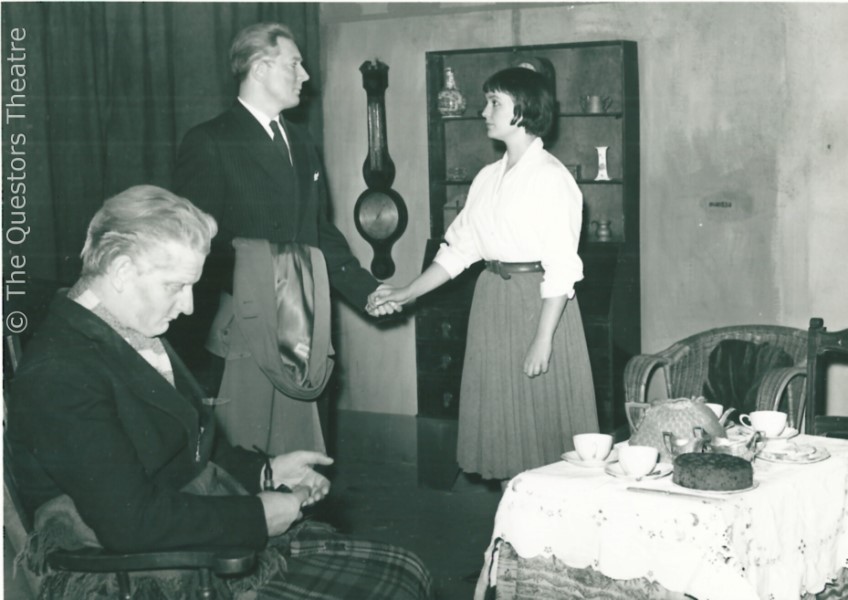
The season opened with what the director, John Clemow, described as "an uncompromising play which deals with human problems quite starkly and without pulling punches. It is about the vitality of faith and human fallibility."
The cast included Ffrangcon Price (Whelan), Dorinne Ingram, Rachelle Ellis, and Paul Imbusch.
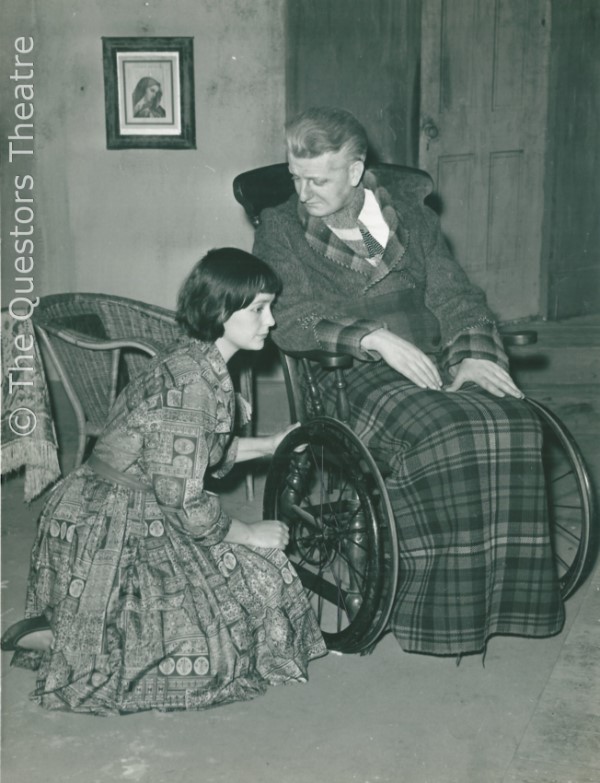
Douglas McVay (Middlesex County Times) thought it contained "some fine performances. Rachelle Ellis lays bare with surgical precision in a single scene the cankered bones of the hysteric. Paul Imbusch establishes with equal skill the introspective, ageing hero.... And Ffrangcon Price, ideally cast, brings to Rose that blend of romantic fervour and spiritual unrest which is her special gift."
October 1961
EPITAPH FOR GEORGE DILLON
by John Osborne
Directed by Raymond Moss
Designed by Michael Collins
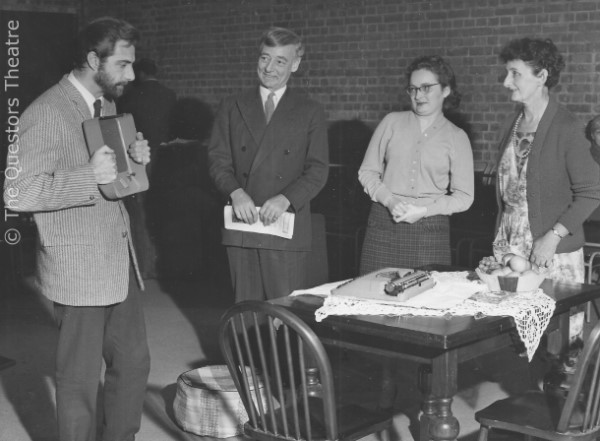
The director of this studio production, Raymond Moss, described the piece as “one of the few definitive plays on the plane of social realism and naturalism," remarking how the cast "found it gaining in intensity and excitement at every rehearsal."
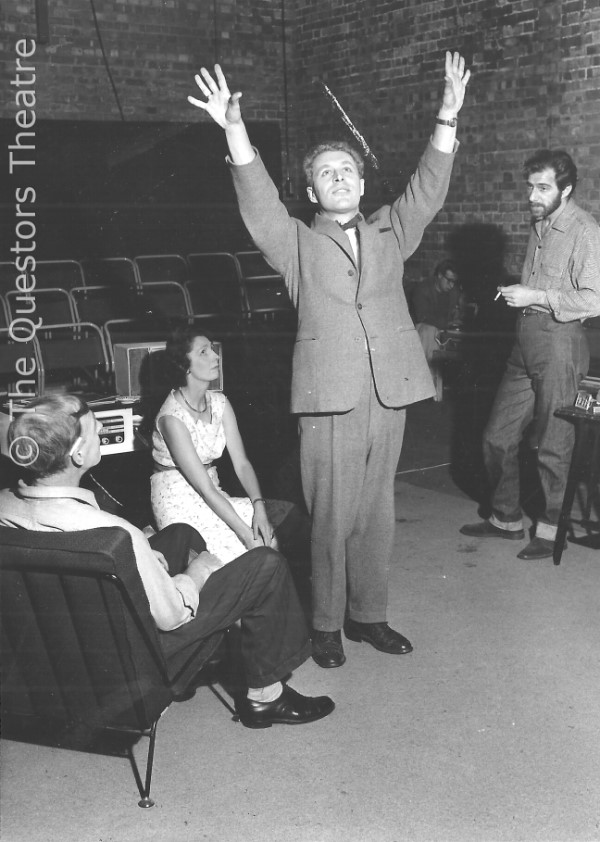 Douglas McVay (Middlesex County Times), who had serious reservations about the quality of the play, suggested that in her role of "Kensingtonian emotionalism" Kit Emmet "battles gamely but unavailingly with a part which one feels Celia Johnson alone might be able to make tolerable," and that "in Larry Irvin's performance, the disagreeable side [of George Dillon] is muted. But Philip Wright, Betty Ogden, Sylvia Estop, and especially Dorothy Boyd Taylor plump-slumped and blinkingly bespectacled as the Plain Jane daughter, (a sea-change from Chekhov's Irina), form a convincing family group."
Douglas McVay (Middlesex County Times), who had serious reservations about the quality of the play, suggested that in her role of "Kensingtonian emotionalism" Kit Emmet "battles gamely but unavailingly with a part which one feels Celia Johnson alone might be able to make tolerable," and that "in Larry Irvin's performance, the disagreeable side [of George Dillon] is muted. But Philip Wright, Betty Ogden, Sylvia Estop, and especially Dorothy Boyd Taylor plump-slumped and blinkingly bespectacled as the Plain Jane daughter, (a sea-change from Chekhov's Irina), form a convincing family group."
November 1961
HENRY IV PART 1
by William Shakespeare
Directed by Alfred Emmet
Designed by Tadeusz Orlowicz
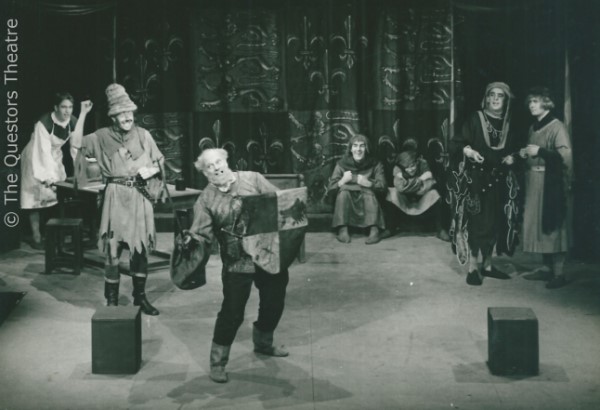
This was the last large-scale production to be squeezed onto the tin hut stage. Its "star-studded" cast included the familiar faces of Alan Drake, Ned Gethings, Michael Green, John Howard, Dorinne Ingram, Bill Rudderham, Wilf Sharp, Doug Thomas and Bill Wall.
Derek Chandler was making his first appearance, as was Myles McDowell who hadn't yet passed his acting audition and whose casting as Prince Hal had been subject to the Committee of Management's express approval.
Michael Langridge, John Turner, Wylie Longmore and Estelle Hampton were drafted in from the Student Group.
Douglas McVay (Middlesex County Times) praised Alfred Emmet for deploying "his company with proficiency, valuably assisted by Tadeusz Orlowicz's sets [appropriately echoing the old Globe], Marjorie Golsby's costumes and Bill Rudderham's vigorously arranged duels. The battles are full of original detail, ranging from lusty shield-thwacking to soldiers spitted by arrows in midstride and finished off by vulturine scavengers."
 He reserved special praise for John Howard's Falstaff: "Eyes rolling in cherubic calculation, lips parting in cherubically self-satisfied smile or mountainously shaking chuckle, John Howard can never hope to be better cast."
He reserved special praise for John Howard's Falstaff: "Eyes rolling in cherubic calculation, lips parting in cherubically self-satisfied smile or mountainously shaking chuckle, John Howard can never hope to be better cast."
The production featured in the Ealing Drama Festival, though non-competitively. The festival adjudicator praised Bernard McLaughlin as the King, Tony King as Hotspur (although he thought he was "occasionally too reflective for so impetuous a character"), John Howard as Falstaff and Dorinne Ingram as Mistress Quickly - whose performance "when she got thoroughly into the part, was an admirable one." He said the fight "was cleverly managed" but he would have preferred the noises off "a little less staccato and more piano!"
Postscript -
"During the rehearsals for HENRY IV PART 1 in 1961 a number of members of the Committee who were in the play felt that valuable drinking time was being lost getting to The Three Pigeons or to The Black Lion in Hammersmith which stayed open until 11.00 pm. The bar began to open more regularly as a result, although it was not until November 8th 1963 that the Committee agreed to the system of opening each night and Sunday lunchtime."
A Few Drops of Water, Chapter 16
December 1961
THE RULES OF THE GAME
by Luigi Pirandello
translated by Frederick May
Directed by Clifford Webb and Shirley Butler
Designed by Dacre Punt
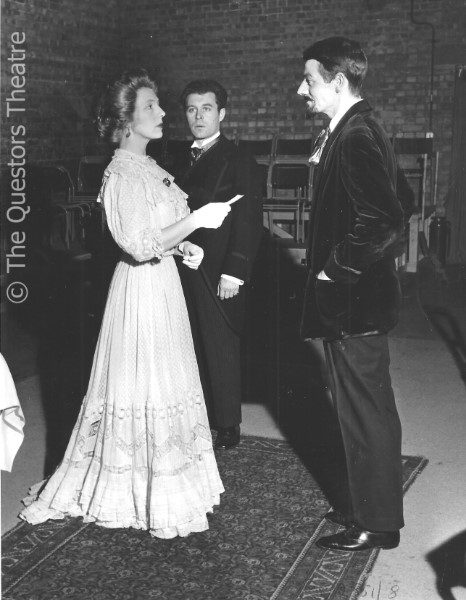 There is very little to say about this studio production - except that Douglas McVay (Middlesex County Times) was not impressed!
There is very little to say about this studio production - except that Douglas McVay (Middlesex County Times) was not impressed!
"Act One begins by introducing us to a curly-headed plump young man with a wearily cynical smile. He is played by Geoffrey Sasse, but in the text he inevitably answers to the name of Guido and is the lover of Silia (Gwen Grounds), a feminist cross between Ann Whitfield and Simone de Beauvoir, though possessing the wit and wisdom of neither. Leone, as written by the author and portrayed by Mr McQueen, is a kind of flagellating Fanny Craddock."
December 1961
MELODRAMA DOUBLE BILL
BOX AND COX
by John Maddison Morton
LADY AUDLEY'S SECRET
by J M Hazelwood
Directed Michael Green and Laurence Nixon
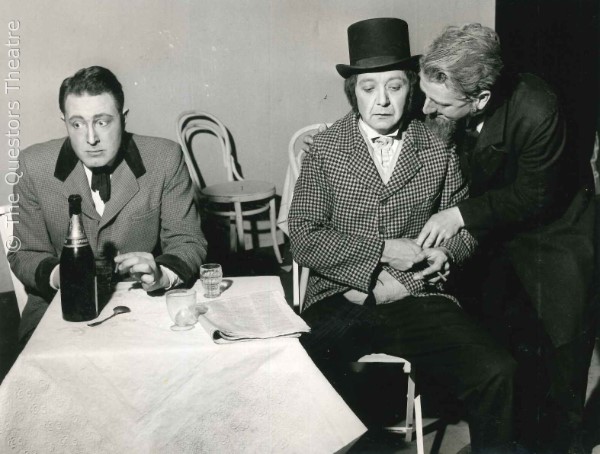
Having got over the dullness of the Pirandello, Douglas McVay had a ball with the Christmas Melodrama!
"Her ladyship [Lady Audley] turns out to be a bigamist who attempts to croak her inopportunely resurrected first husband with a croquet mallet, provoking on the night your reporter was present hearty shouts of "Well played!" among the sportloving English audience.
"Mrs Field (née Craik) hisses and swishes to the manner born as the polyandrous protagonist, depetalling flowers with maniac malevolence before finally going bonkers in a style fully worthy of that other shady Lady (no, not Chatterley; I mean the Thane of Fife's wife)."
McVay was also ecstatic about the The Temperence Quartet who were brought in to entertain the audience during the interval:
"Mr Howard's basso profundo interjections on "Have courage, my boy, and say no"; Mrs Emmet's affecting trill at a pathetic moment in a lyric; Miss Taylor's primly folded hands, clear proof of her determined abstinence; Mr Taylor's fervent pulling gesture on "Hear the temperance bells" (although possibly reminiscent of something rather different from a bell-rope): these were memories to cherish."
January 1962
A MONTH IN THE COUNTRY
by Ivan Turgenev
Directed by Collette King
Designed by Jane Kingshill
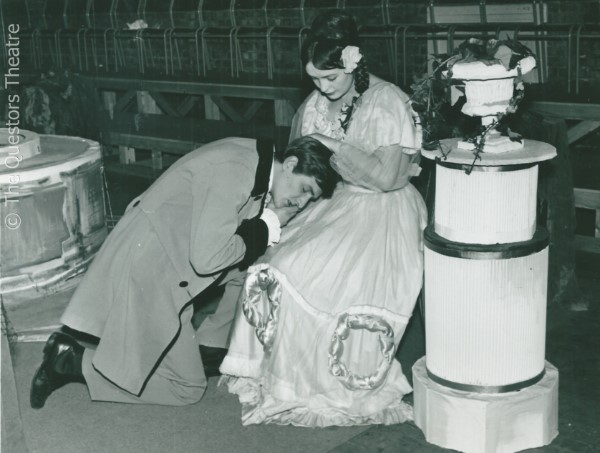
A core team of players brought Turgenev's classic to the Studio, including Patrick Bacon, Tony Barber, Dorothy Boyd-Taylor, Kenneth Conington, Rachelle Ellis, Ned Gethings, Bill Rudderham, Ruth Tremayne Smith, Ffrangcon Whelan, Philip Wright and a very young Robin Ingram.
 Douglas McVay (Middlesex County Times) thought the company caught the atmosphere of "that 'morbid and consumptive relationship' we call sexual love" only in "shreds and patches", but praised the way Ned Gethings shifted the humour to a "note of wistfulness" in his courtship (as the servant) of Carol Adam' maid.
Douglas McVay (Middlesex County Times) thought the company caught the atmosphere of "that 'morbid and consumptive relationship' we call sexual love" only in "shreds and patches", but praised the way Ned Gethings shifted the humour to a "note of wistfulness" in his courtship (as the servant) of Carol Adam' maid.
However, McVay was somewhat obsessed with Ffrangcon Whelan's costume, in particular her hair style which "dangles on each side of her face like a hangman's noose" and her dress which was "reminiscent of a wine-stained dressing-gown... She still looks the part, since she would look the part if she wore sackcloth and ashes."
March 1962
LYSISTRATA
by Aristophanes
translated by Patric Dickinson
Directed by Michael Almaz
Designed by John Rolfe
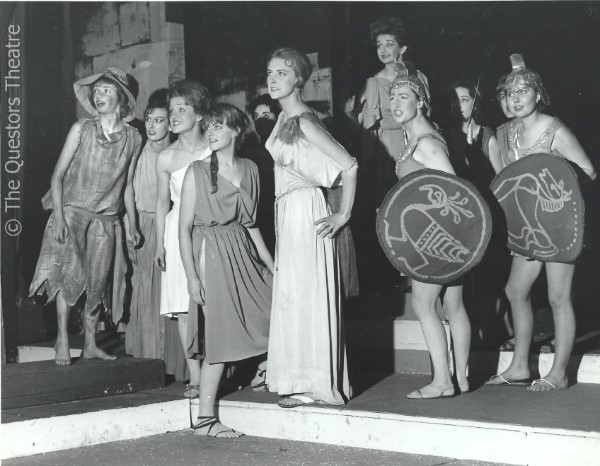
Members had been warned! "Vigorous, racy, outspoken and bawdy!" But that didn't stop at least one audience member writing to the the Chairman about "our acute distress and disgust at the obscene actions we were forced to witness as we were too shocked to get up and walk out".
So the director, Michael Almaz, certainly got something right!
 Douglas McVay (Middlesex County Times) described the play as "perhaps the bluest joke in world drama.... Unfortunately the play doesn't maintain this level [of Rabelaisian grandeur] throughout: and Michael Almaz's production at the Questors Theatre, though in the good scenes it is very, very good, makes the bad ones appear - if not horrid - at any rate even weaker than they actually are."
Douglas McVay (Middlesex County Times) described the play as "perhaps the bluest joke in world drama.... Unfortunately the play doesn't maintain this level [of Rabelaisian grandeur] throughout: and Michael Almaz's production at the Questors Theatre, though in the good scenes it is very, very good, makes the bad ones appear - if not horrid - at any rate even weaker than they actually are."
"The opening, in which Lysistrata and her girl-friends decide to deny their men amorous rights unless the war against Sparta is ended, is a classically crisp, uninhibitedly funny bit of exposition. In it, Jo Arundel as a reluctant abstainer, takes her chances with frustrated gusto: while Mr. Almaz brings some happy inventiveness to two young ladies from Lesbos who sing to each other
"I Can't Give You Anything But Love, Baby." But the climax, in every sense, comes when Lysistrata’s plan goes into practice, causing much dejection to Greeks and Spartans alike. Laurence Nixon, John Allcock, Nick Tagliacozzo, and above all Lawrence Irvin, enact these passages in a manner to make the most of them."
March 1962
DEATH OF A SALESMAN
by Arthur Miller
Directed by Charles Marowitz
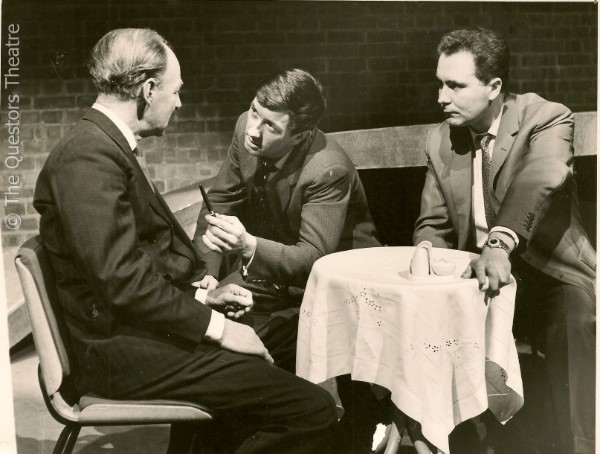
In a bulletin to members outlining forthcoming productions, Alfred Emmet announced that DEATH OF A SALESMAN, which was to have been directed by Pamela Richards had now been put in the hands of a young American Director by the name of Charles Marowitz who had just published a book called "The Method as Means". Alfred's faith in this young director led him to recommend that the production's budget should be allowed to exceed the standard £30 for Studio productions and that the run should be extended by three extra performances.
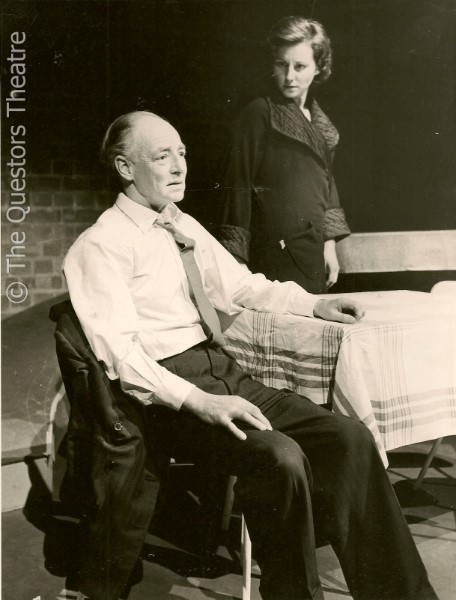 All however did not go well with what seems to have been a breakdown in communications between the director, the designer, the construction team and the Questors treasurer.
All however did not go well with what seems to have been a breakdown in communications between the director, the designer, the construction team and the Questors treasurer.
One ex-member of the Student Group recalls being drafted in at the last minute to help complete the set after the construction team had stormed out following a row with Mr Marowitz.
What is remarkable and extremely unusual is that, apart from the printed programme and Alfred Emmets' original announcement, Mr Marowitz's name is not mentioned anywhere else in our archives, not in any reports, reviews, or memoirs. It's almost as if his time with us had never happened.
And yet within a few years he had become the enfant terrible of the theatre world, teaming up with Peter Brook to direct the RSC's Theatre of Cruelty season, forming his own experimental theatre company, Open Space, and presenting his notorious and tradition-breaking adaptations of Shakespeare's plays.
Clearly he was just too hot for even Questors to handle!
Postscript:
I have just discovered a mention of the production in Douglas McVay's look back over the season in the Middlesex County Times of July 1962 in which he refers to "Charles Marowitz's uniformly well-acted production of 'A Death of a Salesman'.
May 5 1962
PYGMALION
by Bernard Shaw
Directed by Barbara Hutchins (Kit Emmet)
Designed by Ian Toplis
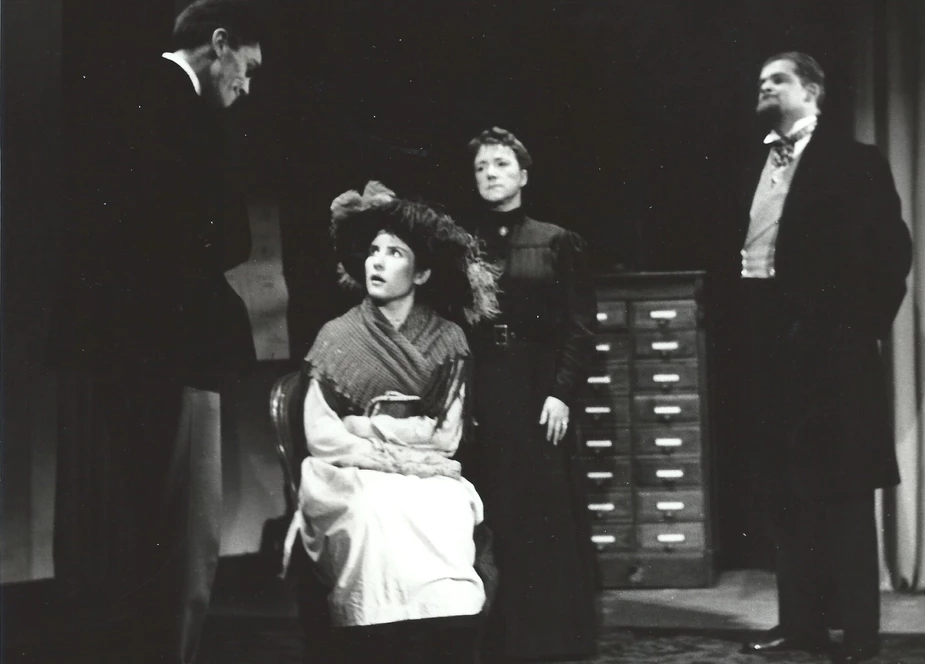
This production was originally intended to travel to a theatre festival in Gibraltar, along with a revival of THE GLASS MENAGERIE, but at the last minute the invitation fell through. Instead it became the last full production to be performed in the old theatre. Paul Imbusch and Alan Drake repeated their portrayals from the 1957 production as Mr Doolittle and Freddy Eynsford-Hill respectively; Betty Ogden took a step up from Mrs Higgins to play Mrs Eynsford-Hill; and Bill Rudderham was promoted from bystander to Colonel Pickering.
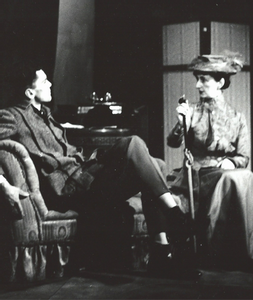 Reviewer Douglas McVay (Middlesex County Times) praised the production and performances for "Questors’ customary neatness and disciplined fluency," although he wasn't so sure about the decision to have Eliza "lapse from her impeccably accented pose of solemnity when speaking the famous exit-line ["not bloody likely"]. My personal feeling is that the hilarious shock is diminished, rather than increased, by the reversion to cheery Covent Garden informality"; and he wasn't happy about "the alteration of the ending to suggest a happy romantic future for Liza and Higgins. I know that it’s the ending we’d prefer, and they had it in 'My Fair Lady'- But this isn’t 'My Fair Lady', it’s 'Pygmalion' and should be given as written."
Reviewer Douglas McVay (Middlesex County Times) praised the production and performances for "Questors’ customary neatness and disciplined fluency," although he wasn't so sure about the decision to have Eliza "lapse from her impeccably accented pose of solemnity when speaking the famous exit-line ["not bloody likely"]. My personal feeling is that the hilarious shock is diminished, rather than increased, by the reversion to cheery Covent Garden informality"; and he wasn't happy about "the alteration of the ending to suggest a happy romantic future for Liza and Higgins. I know that it’s the ending we’d prefer, and they had it in 'My Fair Lady'- But this isn’t 'My Fair Lady', it’s 'Pygmalion' and should be given as written."
He had special praise for Paul Imbusch as Doolittle reminding us that he,"among the Ealing company, has the gift of running off with any show in which he appears."
September 1962
GOING, GOING!
PYGMALION was the last main production in the old theatre but the honour of being the last play to be performed on that stage goes to THE CHILDREN OF SATURN by Lydia Ragosin, one of the plays in that year's New Plays Festival (and, incidentally, introducing Martin Bowley onto our stage, just in time to secure him as a bona fide Old Tin Hutter).
Gwenan Evans takes up the story in this extract from A Few Drops of Water:
The Tin Hut...was celebrated in a nostalgic entertainment entitled GOING, GOING!, arranged by Wilf Sharp with music by Eric Kirby and performed by them and the other stalwarts of the many previous Questors revues on 29th September 1962. It was billed as "Positively the last performance of any kind to be given in the old Questors Theatre before it is demolished to make way for the new" and tickets were priced at 10/6d.
Issue number 7 of Quest News describes the occasion thus :
 "I do not think there can have been so many people in the theatre at any time since the permanent seating was put in in 1938. Everyone seemed to share the sense of occasion ... Though much of the evening was naturally nostalgic in tone, the final emphasis was on the future. As the programme note said 'The new theatre is the inheritance of the young in heart'. Incidentally the Grapevine Bar (despite the exhortations of the Temperance Quartet [opposite]) took a record total of £64 during the evening."
"I do not think there can have been so many people in the theatre at any time since the permanent seating was put in in 1938. Everyone seemed to share the sense of occasion ... Though much of the evening was naturally nostalgic in tone, the final emphasis was on the future. As the programme note said 'The new theatre is the inheritance of the young in heart'. Incidentally the Grapevine Bar (despite the exhortations of the Temperance Quartet [opposite]) took a record total of £64 during the evening."
The evening ended with a most appropriate, and totally unrehearsed, finale. At the end of the performance, the atmosphere was electric and the audience demanded curtain call after curtain call. The perspiring Stage Manager did sterling service closing and opening the curtain, which ran along a track behind the proscenium pelmet, parting in the middle. Eventually, the poor curtain track could take no more — as the curtain halves slowly advanced towards the centre for the umpteenth time, there was a loud crack and the curtain refused to budge any further. After nearly 30 years of faultless operation, the track had broken, occasioning a characteristic observation from George Benn to the effect that in any well-designed structure all the components should fail at the same time. (It is claimed that he was then left to lock up in case the roof also caved in.)
After the final curtain call, with all the cast still gathered on stage, Alfred Emmet stepped forward. Most people expected a nostalgic speech, harking back to the good old times in the Tin Hut. They should have known him better; all Alfred said was "At six o'clock this evening, the New Theatre Fund stood at . . .", gave the exact figure and walked off. A striking way of reminding everyone to start looking forward, not back.
Work started on stripping out the old Theatre immediately.....

THE END




 Douglas McVay (Middlesex County Times), who had serious reservations about the quality of the play, suggested that in her role of "Kensingtonian emotionalism" Kit Emmet "battles gamely but unavailingly with a part which one feels Celia Johnson alone might be able to make tolerable," and that "in Larry Irvin's performance, the disagreeable side [of George Dillon] is muted. But Philip Wright, Betty Ogden, Sylvia Estop, and especially Dorothy Boyd Taylor plump-slumped and blinkingly bespectacled as the Plain Jane daughter, (a sea-change from Chekhov's Irina), form a convincing family group."
Douglas McVay (Middlesex County Times), who had serious reservations about the quality of the play, suggested that in her role of "Kensingtonian emotionalism" Kit Emmet "battles gamely but unavailingly with a part which one feels Celia Johnson alone might be able to make tolerable," and that "in Larry Irvin's performance, the disagreeable side [of George Dillon] is muted. But Philip Wright, Betty Ogden, Sylvia Estop, and especially Dorothy Boyd Taylor plump-slumped and blinkingly bespectacled as the Plain Jane daughter, (a sea-change from Chekhov's Irina), form a convincing family group."
 He reserved special praise for John Howard's Falstaff: "Eyes rolling in cherubic calculation, lips parting in cherubically self-satisfied smile or mountainously shaking chuckle, John Howard can never hope to be better cast."
He reserved special praise for John Howard's Falstaff: "Eyes rolling in cherubic calculation, lips parting in cherubically self-satisfied smile or mountainously shaking chuckle, John Howard can never hope to be better cast." There is very little to say about this studio production - except that Douglas McVay (Middlesex County Times) was not impressed!
There is very little to say about this studio production - except that Douglas McVay (Middlesex County Times) was not impressed!

 Douglas McVay (Middlesex County Times) thought the company caught the atmosphere of "that 'morbid and consumptive relationship' we call sexual love" only in "shreds and patches", but praised the way Ned Gethings shifted the humour to a "note of wistfulness" in his courtship (as the servant) of Carol Adam' maid.
Douglas McVay (Middlesex County Times) thought the company caught the atmosphere of "that 'morbid and consumptive relationship' we call sexual love" only in "shreds and patches", but praised the way Ned Gethings shifted the humour to a "note of wistfulness" in his courtship (as the servant) of Carol Adam' maid.
 Douglas McVay (Middlesex County Times) described the play as "perhaps the bluest joke in world drama.... Unfortunately the play doesn't maintain this level [of Rabelaisian grandeur] throughout: and Michael Almaz's production at the Questors Theatre, though in the good scenes it is very, very good, makes the bad ones appear - if not horrid - at any rate even weaker than they actually are."
Douglas McVay (Middlesex County Times) described the play as "perhaps the bluest joke in world drama.... Unfortunately the play doesn't maintain this level [of Rabelaisian grandeur] throughout: and Michael Almaz's production at the Questors Theatre, though in the good scenes it is very, very good, makes the bad ones appear - if not horrid - at any rate even weaker than they actually are." 
 All however did not go well with what seems to have been a breakdown in communications between the director, the designer, the construction team and the Questors treasurer.
All however did not go well with what seems to have been a breakdown in communications between the director, the designer, the construction team and the Questors treasurer. 
 Reviewer Douglas McVay (Middlesex County Times) praised the production and performances for "Questors’ customary neatness and disciplined fluency," although he wasn't so sure about the decision to have Eliza "lapse from her impeccably accented pose of solemnity when speaking the famous exit-line ["not bloody likely"]. My personal feeling is that the hilarious shock is diminished, rather than increased, by the reversion to cheery Covent Garden informality"; and he wasn't happy about "the alteration of the ending to suggest a happy romantic future for Liza and Higgins. I know that it’s the ending we’d prefer, and they had it in 'My Fair Lady'- But this isn’t 'My Fair Lady', it’s 'Pygmalion' and should be given as written."
Reviewer Douglas McVay (Middlesex County Times) praised the production and performances for "Questors’ customary neatness and disciplined fluency," although he wasn't so sure about the decision to have Eliza "lapse from her impeccably accented pose of solemnity when speaking the famous exit-line ["not bloody likely"]. My personal feeling is that the hilarious shock is diminished, rather than increased, by the reversion to cheery Covent Garden informality"; and he wasn't happy about "the alteration of the ending to suggest a happy romantic future for Liza and Higgins. I know that it’s the ending we’d prefer, and they had it in 'My Fair Lady'- But this isn’t 'My Fair Lady', it’s 'Pygmalion' and should be given as written." "I do not think there can have been so many people in the theatre at any time since the permanent seating was put in in 1938. Everyone seemed to share the sense of occasion ... Though much of the evening was naturally nostalgic in tone, the final emphasis was on the future. As the programme note said 'The new theatre is the inheritance of the young in heart'. Incidentally the Grapevine Bar (despite the exhortations of the Temperance Quartet [opposite]) took a record total of £64 during the evening."
"I do not think there can have been so many people in the theatre at any time since the permanent seating was put in in 1938. Everyone seemed to share the sense of occasion ... Though much of the evening was naturally nostalgic in tone, the final emphasis was on the future. As the programme note said 'The new theatre is the inheritance of the young in heart'. Incidentally the Grapevine Bar (despite the exhortations of the Temperance Quartet [opposite]) took a record total of £64 during the evening."